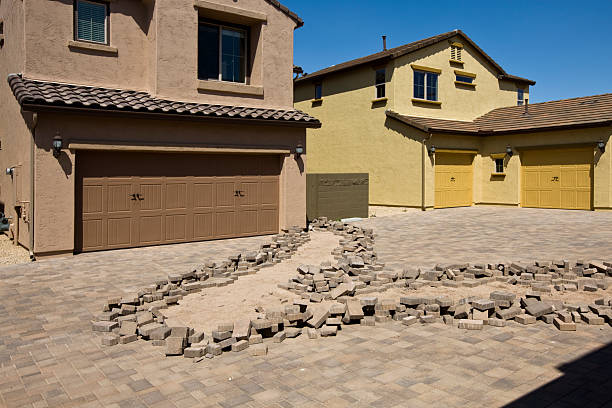
In Mesa, AZ, where temperatures regularly soar above 100°F and monsoon rains arrive in sudden bursts, leaving pavers unsealed can lead to rapid and costly deterioration. Pavers that are not properly sealed become vulnerable to fading, staining, cracking, and shifting, reducing both beauty and safety.
Sealing isn’t just cosmetic—it’s critical protection against Arizona’s extreme weather.
Key Takeaways
Unsealed pavers quickly fade, stain, and weaken under Arizona’s harsh climate.
Damage from UV rays, rain, and sandstorms is accelerated without sealing.
Professional sealing preserves appearance, stability, and long-term value.
Why Mesa’s Climate Punishes Unsealed Pavers
Mesa’s environment exposes outdoor surfaces to:
High UV radiation that bleaches surface colors
Blowing dust and debris that erode surface layers
Heavy monsoon downpours that cause water infiltration and erosion
Wide temperature swings that stress and crack materials
Without sealing, pavers are defenseless against these aggressive forces.
Our Paver Sealing Services in Fountain Hills, AZ demonstrate how the right protection extends paver life dramatically in Arizona’s toughest conditions.
What Happens When Pavers Are Left Unsealed?
Fading and Color Loss
Sun exposure rapidly bleaches pavers, turning rich, vibrant surfaces into dull, washed-out patches.
Bob Vila recommends UV-stable sealers to retain color, especially in desert environments where sun exposure is constant.
Staining from Dirt, Oil, and Organic Matter
Unsealed pavers act like sponges, absorbing:
Oil from vehicles and grills
Dirt and dust from storms
Organic debris from nearby plants
These stains sink deep into the surface, becoming nearly impossible to remove without aggressive cleaning or resurfacing.
Erosion of Joint Sand
Monsoon rains and irrigation systems wash away the sand that locks pavers in place. Without joint stabilization:
Weeds grow between pavers
Ants and pests burrow into the gaps
Pavers shift, creating tripping hazards and surface instability
Mold and Mildew Growth
During humid monsoon seasons, water trapped inside porous, unsealed pavers breeds:
Mold
Mildew
Unsightly black and green staining
The Spruce highlights that sealing pavers prevents moisture infiltration that leads to these common problems.
Surface Cracking and Structural Damage
Thermal expansion from Arizona’s extreme day-to-night temperature swings stresses unprotected surfaces.
Over time, this leads to:
Hairline cracks
Chipping and surface flaking
Full structural failure of the paver base
Sealing strengthens the surface and prevents water from exacerbating cracks.
Common Mistakes Mesa Homeowners Make—and How to Avoid Them
Ignoring early signs of damage: Small cracks and fading are easier to address early.
Using cheap, low-grade sealers: These provide minimal protection against Arizona’s severe elements.
Waiting too long to seal: Allowing damage to set in results in expensive repairs or full replacement.
Trusting professionals like Paver Sealing Arizona ensures your pavers are properly prepped, sealed, and protected to handle Mesa’s harsh climate.
Benefits of Sealing Your Pavers
Professional sealing:
Protects vibrant color and natural appearance
Blocks stains from oil, dirt, and plant material
Stabilizes joint sand to prevent shifting
Prevents moisture damage, mold growth, and cracking
Routine maintenance and resealing every few years maximize the life and beauty of your investment.
Protect Your Mesa Pavers Before It’s Too Late
In Mesa’s unforgiving desert climate, unsealed pavers deteriorate quickly—leading to costly repairs and replacements. Sealing now ensures your outdoor spaces stay strong, beautiful, and safe for years to come.
Contact Paver Sealing Arizona today to schedule your consultation. Let’s protect your investment with expert paver sealing solutions designed specifically for Arizona homeowners.

